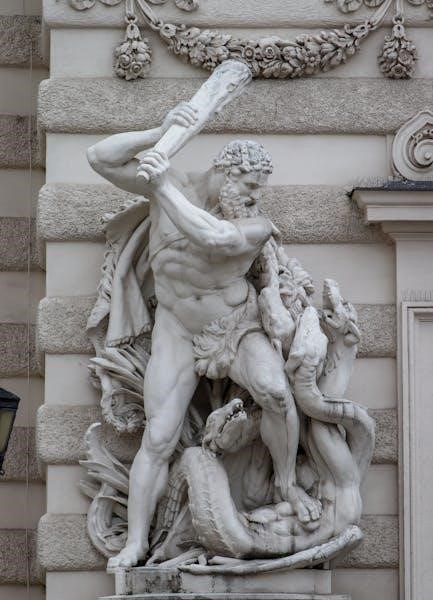
anthology of classical myth pdf
The Anthology of Classical Myth offers a comprehensive collection of primary sources, providing insights into ancient Greek, Roman, and Near Eastern mythologies. It includes renowned texts like the Epic of Gilgamesh and Enuma Elish, translated into modern English for accessibility. This anthology serves as a foundational resource for understanding the cultural and historical significance of classical myths, enabling comparative studies and highlighting their enduring influence on literature and art.
Definition and Scope of Classical Mythology
Classical mythology encompasses the myths, legends, and cultural narratives of ancient Greek and Roman civilizations. It explores themes of creation, heroism, and divine-human interactions, offering insights into the beliefs and values of these societies. The scope extends to include Near Eastern influences, such as Babylonian and Hittite texts, providing a broader comparative context; These stories not only explain natural phenomena but also address fundamental human experiences, making classical mythology a rich and diverse field of study.
Significance of Studying Classical Myths
Studying classical myths provides insights into the cultural, religious, and philosophical foundations of ancient civilizations. These narratives reveal societal values, moral lessons, and explanations for natural phenomena. By examining primary sources like the Epic of Gilgamesh and Greek myths, scholars uncover historical contexts and cross-cultural influences. Classical myths also inspire artistic and literary works, showcasing their enduring relevance. Understanding these stories fosters interdisciplinary research and enriches modern scholarship, making them essential for exploring human experiences and cultural evolution across time.
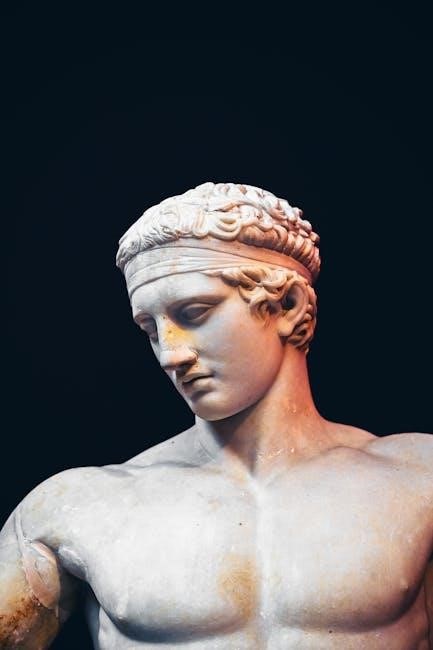
Structure and Contents of the Anthology
The anthology is organized into sections, featuring primary sources like the Epic of Gilgamesh and Greek myths, with translations and appendices, including Linear B sources.
Overview of the Anthology of Classical Myth
The Anthology of Classical Myth is a curated collection of primary sources, offering translations of ancient Greek, Roman, and Near Eastern texts. It includes iconic works like the Epic of Gilgamesh, Enuma Elish, and Hittite myths, providing a comparative perspective. The second edition expands its scope, adding more Near Eastern texts to highlight cultural parallels. Designed for academic use, it serves as a companion to undergraduate courses, offering direct access to foundational mythological narratives. Edited by Stephen Trzaskoma, R. Scott Smith, and Stephen Brunet, it features translations and an appendix on Linear B sources. ISBN: 9781624664977, 517 pages.
Primary Sources in Translation
The Anthology of Classical Myth presents primary sources translated into modern English, ensuring accessibility for contemporary readers. It includes the Epic of Gilgamesh, Enuma Elish, and Atrahasis, alongside Hittite and Greek texts like Apollodorus’ The Library. These translations maintain the original narratives’ integrity while making them understandable to students and scholars. The anthology’s approach bridges ancient and modern languages, facilitating a deeper understanding of classical mythology’s cultural and historical contexts. This resource is essential for academic studies and comparative analyses of mythological traditions.
Key Features of the Anthology
The Anthology of Classical Myth stands out for its diverse range of primary sources, including Greek, Roman, and Near Eastern texts. It features new translations by renowned scholars, ensuring accuracy and readability. The second edition expands on the first by incorporating more Near Eastern narratives, such as the Epic of Gilgamesh and Enuma Elish, alongside Hittite and Babylonian works. An appendix on Linear B sources enhances its scholarly appeal. This anthology is designed to be both a standalone resource and a companion for undergraduate courses, making it invaluable for mythological studies.
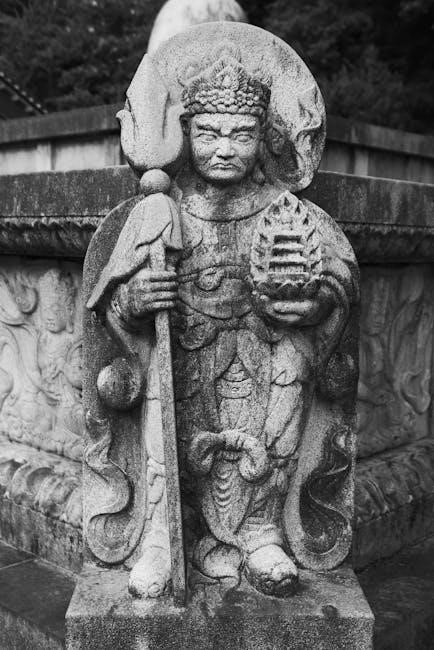
Editions and Updates
The first edition of the Anthology of Classical Myth was published in 2004, offering foundational primary sources. The second edition, released in 2016, expanded with new translations and Near Eastern texts, enhancing its scholarly depth and educational value.
First Edition (2004) and Its Impact
The Anthology of Classical Myth debuted in 2004, becoming a vital resource for scholars and students. Edited by Stephen Trzaskoma, R. Scott Smith, and Stephen Brunet, it presented primary sources in translation, offering direct access to foundational myths. This edition emphasized Greek and Roman narratives, providing a clear and accessible format. Its impact was significant, filling a gap in classical studies by providing reliable translations and fostering a deeper understanding of mythological themes. The anthology quickly became a standard in undergraduate courses, establishing itself as an essential tool for exploring classical mythology.
Second Edition (2016) and New Inclusions
The 2016 edition of the Anthology of Classical Myth expanded its scope by incorporating key Near Eastern texts, including the Epic of Gilgamesh, Enuma Elish, and Atrahasis. These additions allowed for comparative analysis between Greek and Mesopotamian mythologies, enriching the study of cultural influences. New translations and an appendix on Linear B sources enhanced the anthology’s depth. This edition solidified its reputation as a comprehensive resource, offering a broader perspective on ancient myths and their interconnectedness across civilizations. It remains a cornerstone for modern classical studies and interdisciplinary research.
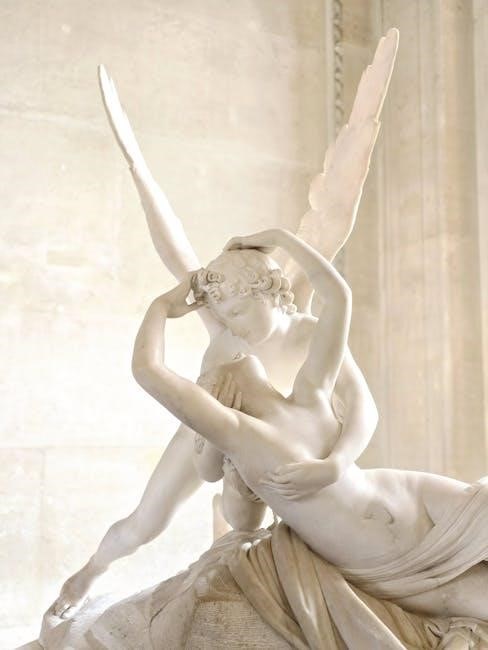
Near Eastern Influences
The anthology incorporates key Near Eastern texts, such as the Epic of Gilgamesh and Enuma Elish, highlighting cultural exchanges and mythological parallels with ancient Greek narratives.
Inclusion of Babylonian and Hittite Texts
The anthology features seminal Babylonian texts like the Epic of Gilgamesh, Enuma Elish (Epic of Creation), and Atrahasis, alongside the Hittite Song of Emergence. These selections provide a bridge between Mesopotamian and Greek mythologies, revealing shared themes such as creation myths and flood narratives. The inclusion of these texts enriches the anthology’s scope, offering students a broader understanding of ancient mythological traditions and their cultural interconnections. This integration highlights the influence of Near Eastern mythology on classical Greek narratives, fostering comparative analysis and interdisciplinary study.
Comparisons Between Greek and Mesopotamian Mythology
The anthology highlights striking similarities between Greek and Mesopotamian myths, such as shared themes of creation, heroism, and divine intervention. For instance, the Babylonian Epic of Gilgamesh mirrors Greek flood narratives, while both traditions feature underworld journeys and quests for immortality. These parallels underscore the cultural exchange and shared human experiences that shaped ancient mythologies. By juxtaposing these texts, the anthology invites readers to explore the cross-cultural resonance and unique characteristics of each tradition, enriching the understanding of classical mythology’s roots and evolution.

Key Myths and Stories
The anthology features iconic myths like the Epic of Gilgamesh and the story of Orpheus and Eurydice, showcasing their enduring themes of love, loss, and human resilience.

The Epic of Gilgamesh and Its Relevance
The Epic of Gilgamesh, one of the earliest surviving literary works, explores themes of friendship, mortality, and the quest for immortality. Its inclusion in the anthology highlights its influence on classical mythology, offering insights into Mesopotamian culture and human nature. The story of Gilgamesh and Enkidu’s adventures resonates universally, making it a cornerstone of ancient literature. Translated and presented in the anthology, it provides students with a direct link to understanding the origins of mythological storytelling and its enduring relevance across civilizations.
The Myth of Orpheus and Eurydice
The tragic tale of Orpheus and Eurydice captures the essence of love, loss, and the human longing to transcend mortality. Orpheus, a gifted musician, descends into the underworld to reclaim his beloved wife, Eurydice, after her untimely death; His journey highlights the transformative power of art and the enduring bond of love. Featured in the anthology, this myth remains a timeless narrative, resonating with universal themes of grief, hope, and the frailty of human endeavor. It continues to inspire artistic and literary interpretations across cultures and generations.
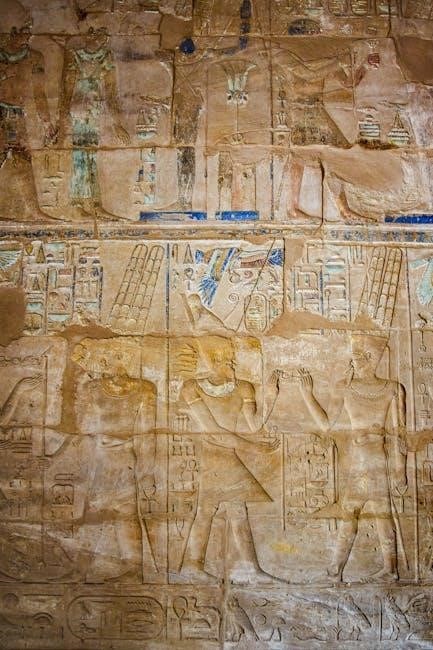
Translations and Language
The anthology features meticulous translations of ancient texts into modern English, ensuring accessibility while preserving the original narratives’ essence and cultural significance.
Approach to Translating Ancient Texts
The anthology employs a rigorous approach to translation, balancing fidelity to the original texts with readability in modern English. Editors carefully preserve the poetic and narrative essence of works like the Epic of Gilgamesh and Hittite myths, ensuring that cultural and historical contexts remain intact. By maintaining the authenticity of ancient voices, the translations facilitate a deeper understanding of mythological themes and their relevance across time.
Challenges in Rendering Mythological Narratives
Translating ancient myths presents unique challenges, including preserving poetic structures and cultural nuances while ensuring clarity. The anthology addresses these by carefully adapting meter and diction to modern English, maintaining the original intent of works like Apollodorus’ Library. Editors also navigate ambiguities in archaic languages, ensuring that the essence of mythological themes, such as the Orpheus and Eurydice myth, remains accessible and meaningful to contemporary readers without losing their historical depth.
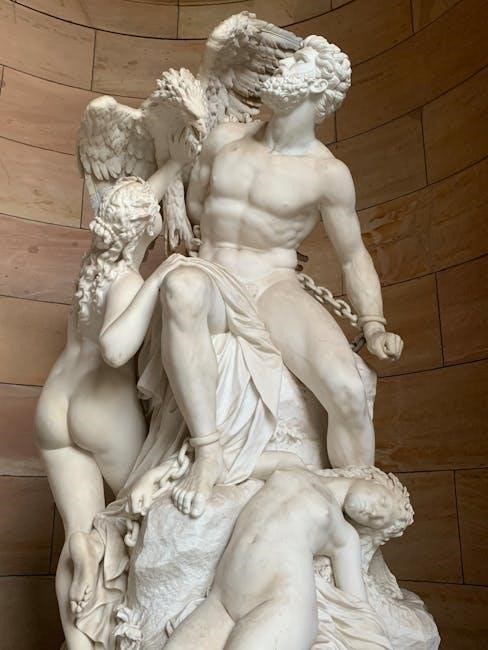
Educational Significance
The Anthology of Classical Myth is a vital teaching tool, offering primary sources that enrich undergraduate courses and serve as a companion to standard mythology textbooks, aiding both students and educators in exploring ancient narratives.
Use in Undergraduate Mythology Courses
The Anthology of Classical Myth is widely used in undergraduate courses for its accessible translations of primary sources, including Greek, Roman, and Near Eastern texts. It complements standard mythology textbooks by providing original narratives like the Epic of Gilgamesh and Enuma Elish, enabling students to analyze foundational myths directly. The anthology’s structure, with prefaces and notes, supports critical thinking and contextual understanding, making it an essential resource for engaging students in the study of classical mythology and its cultural significance.
Companion to Standard Mythology Textbooks
The Anthology of Classical Myth serves as an invaluable companion to standard mythology textbooks, offering primary sources that enrich understanding of classical narratives. By providing original texts like the Epic of Gilgamesh and Enuma Elish, it allows students to engage directly with foundational myths. The anthology’s translations and contextual notes enhance the study of mythology, making it a perfect supplement to traditional textbooks. Its inclusion of Near Eastern and Greek sources fosters comparative analysis, deepening students’ appreciation of mythological themes and their cultural significance.
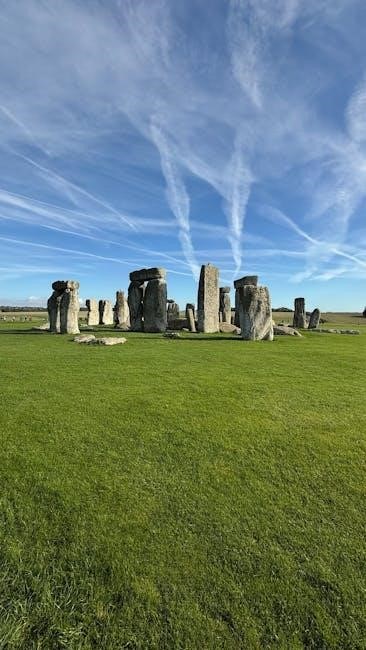
Impact on Classical Studies
The Anthology of Classical Myth has significantly influenced classical studies by providing primary sources, fostering interdisciplinary research, and enabling scholars to explore cultural exchanges between Greek and Near Eastern mythologies.
Role of the Anthology in Modern Scholarship
The Anthology of Classical Myth has become a cornerstone in modern scholarship, offering a diverse collection of translated primary sources that bridge ancient Greek, Roman, and Near Eastern mythologies. By including texts like the Epic of Gilgamesh and Enuma Elish, it facilitates comparative analysis, revealing parallels and contrasts that enrich understanding of cultural influences. This resource not only supports academic research but also encourages interdisciplinary approaches, making it invaluable for scholars exploring the evolution and impact of classical myths in various fields.
Encouraging Interdisciplinary Research
The Anthology of Classical Myth fosters interdisciplinary research by integrating diverse sources, including Greek, Roman, and Near Eastern texts. The inclusion of works like the Epic of Gilgamesh and Enuma Elish alongside Greek myths creates a platform for comparative studies across cultures, histories, and literatures. This approach encourages scholars to explore connections between mythology, art, philosophy, and history, promoting a holistic understanding of ancient civilizations and their enduring legacies in modern intellectual and cultural landscapes.
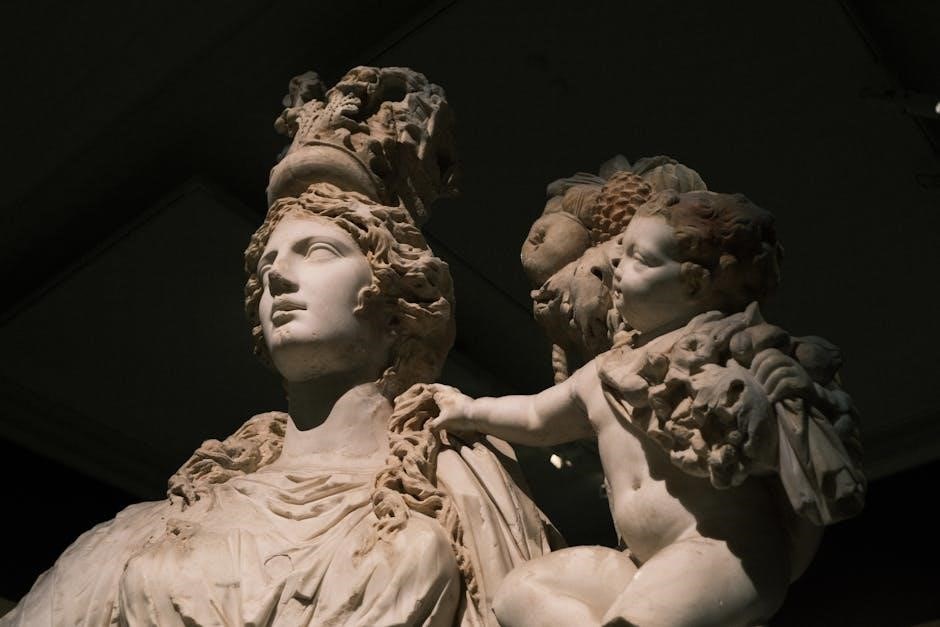
Cultural and Historical Relevance
The Anthology of Classical Myth preserves ancient narratives, offering insights into the cultural and historical contexts of classical civilizations. It bridges past and present, enriching modern understanding.
Mythology in the Modern World
Classical mythology remains a vibrant force in modern culture, inspiring art, literature, and film. The Anthology of Classical Myth bridges ancient narratives with contemporary relevance, offering insights into universal themes. Myths like Orpheus and Eurydice and Persephone continue to influence creative works, while their psychological and philosophical depth resonates in modern thought. The anthology’s inclusion of Near Eastern texts, such as Gilgamesh, highlights shared human experiences across cultures. In the digital age, these stories endure, proving mythology’s timeless appeal and its ability to connect past and present.
Preserving Ancient Narratives for Future Generations
The Anthology of Classical Myth serves as a vital resource for preserving ancient narratives, ensuring their survival for future scholars and enthusiasts. By translating primary sources into modern English, it bridges the gap between antiquity and contemporary understanding. The inclusion of texts like the Epic of Gilgamesh and Enuma Elish highlights the cultural and historical richness of these stories. This anthology not only educates but also safeguards the legacy of classical mythology, making it accessible and relevant for generations to come.
Related Posts

pillowcase pattern with french seams pdf
Want a beautifully finished pillowcase? Get our FREE PDF pattern with easy-to-follow instructions for perfect French seams! Start sewing today & sleep soundly!

books on sexology pdf
Dive into the fascinating world of human sexuality! Find & download free sexology books in PDF format. Explore research, theories & practical insights. Start learning now!

the power of critical thinking 7th edition pdf free
Boost your problem-solving skills! Download the Critical Thinking 7th Edition PDF for free and learn to analyze information like a pro. Get smarter today!